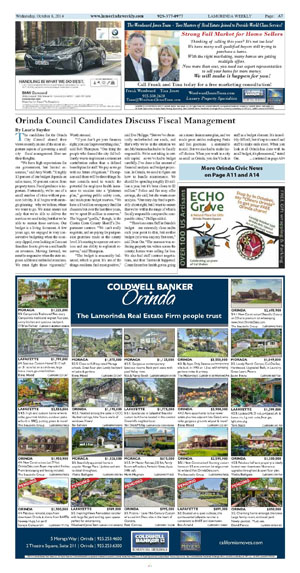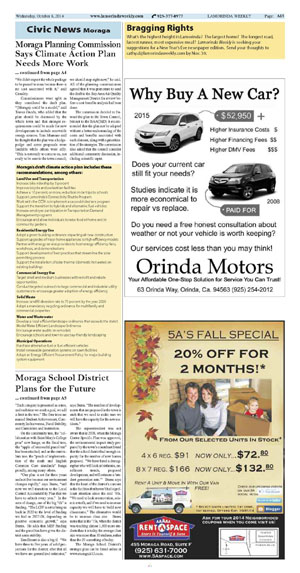|
|
Published October 8th, 2014
|
Orinda Council Candidates Discuss Fiscal Management
|
|
| By Laurie Snyder |
|
|
The candidates for the Orinda City Council shared their views recently on one of the most important aspects of governing a small city - fiscal management. Here are their thoughts.
 "We have high expectations for our government, but limited resources," said Amy Worth. "Roughly 10 percent of our budget depends on sales taxes; 50 percent comes from property taxes. Fiscal prudence is important. Fortunately, we're one of a small number of cities without pension liability. It all begins with strategic planning - why we're here, where we want to go. We must ensure not only that we're able to deliver the services we need today, but that we're able to sustain these services. Our budget is a living document. A few years ago, we engaged in very conservative budgeting when the economy dipped, even looking at Comcast franchise fees to give us a real handle on revenues. Moving forward, we must be responsive when the state imposes additional unfunded mandates. We must fight those vigorously," Worth stressed.
"We have high expectations for our government, but limited resources," said Amy Worth. "Roughly 10 percent of our budget depends on sales taxes; 50 percent comes from property taxes. Fiscal prudence is important. Fortunately, we're one of a small number of cities without pension liability. It all begins with strategic planning - why we're here, where we want to go. We must ensure not only that we're able to deliver the services we need today, but that we're able to sustain these services. Our budget is a living document. A few years ago, we engaged in very conservative budgeting when the economy dipped, even looking at Comcast franchise fees to give us a real handle on revenues. Moving forward, we must be responsive when the state imposes additional unfunded mandates. We must fight those vigorously," Worth stressed.
 "If you don't get your finances right, you can forget everything else," said Bob Thompson. "One thing the people who formed the city did brilliantly was to implement a retirement contribution rather than a defined benefit plan for staff. We pay as we go with no future obligations." Thompson said there will be three things future councils need to watch: the potential for employee health insurance to escalate into a "platinum plan," growing public safety costs, and inadequate budget reserves. "We have a $5 million emergency fund for disasters but over the last three years, we've spent $4 million in reserves." The biggest "gorilla," though, is the Contra Costa County Sheriff's Department contract. "We can't really negotiate, and are paying for past pension promises made at the county level. It's starting to squeeze out services and our ability to replenish reserves," said Thompson.
"If you don't get your finances right, you can forget everything else," said Bob Thompson. "One thing the people who formed the city did brilliantly was to implement a retirement contribution rather than a defined benefit plan for staff. We pay as we go with no future obligations." Thompson said there will be three things future councils need to watch: the potential for employee health insurance to escalate into a "platinum plan," growing public safety costs, and inadequate budget reserves. "We have a $5 million emergency fund for disasters but over the last three years, we've spent $4 million in reserves." The biggest "gorilla," though, is the Contra Costa County Sheriff's Department contract. "We can't really negotiate, and are paying for past pension promises made at the county level. It's starting to squeeze out services and our ability to replenish reserves," said Thompson.
 "The budget is reasonably balanced, which is great. It's one of the things residents find most positive," said Eve Philipps. "But we've chronically underfunded our roads, and that's why we're in the situation we are. My business has had to be fiscally responsible. We're not taking in outside capital - so we've had to budget carefully. I've done a fair amount of financial analysis and budget projection. In Orinda, we need to figure out how to handle maintenance. We should be spending roughly $3 million a year, but it's been closer to $2 million." Police and fire may offer savings, she said, but she wants more analysis. "Our rainy day fund is probably about right, but I want to ensure that we're within the range of what is fiscally responsible compared to comparable cities," Phillips added.
"The budget is reasonably balanced, which is great. It's one of the things residents find most positive," said Eve Philipps. "But we've chronically underfunded our roads, and that's why we're in the situation we are. My business has had to be fiscally responsible. We're not taking in outside capital - so we've had to budget carefully. I've done a fair amount of financial analysis and budget projection. In Orinda, we need to figure out how to handle maintenance. We should be spending roughly $3 million a year, but it's been closer to $2 million." Police and fire may offer savings, she said, but she wants more analysis. "Our rainy day fund is probably about right, but I want to ensure that we're within the range of what is fiscally responsible compared to comparable cities," Phillips added.
 "There's no extra fluff in Orinda's budget - our extremely clean audits each year point to that, but neither budget cycle was easy my first term," said Dean Orr. "The assessor was reducing property tax values across the county; homes were selling for less. We also had staff contract negotiations, and then Tarabrook happened. Councilmember Smith got us going on a storm drain master plan, and we made great strides reshaping Parks and Rec positions - a sustainable model. But we also had to make layoff choices. When you work in a city as small as Orinda, you don't look at staff as a budget element. It's incredibly difficult, but it's up to council and staff to make ends meet. When you look at all Orinda has done with its small budget, it's phenomenal," stated Orr. Linda Delehunt said she believes balancing Orinda's budget is one of the few things that current officials have done well, but she remains concerned about the details. "I think council is proud of the budget they put out, but it's very simplistic and doesn't represent all of the issues. The city has, for the most part, bypassed the roads problem. The hidden costs that affect citizens don't appear anywhere on the budget. It's missing a whole element regarding infrastructure. How we address this issue is incredibly complicated. Measure J is tiny, but the potential for the tax burden is onerous. We have to think about what our young people are facing when we use bonds. I'd like Orinda to explore becoming a charter city to bring in more revenue, but it's a discussion we need to have with our entire city," said Delehunt.
"There's no extra fluff in Orinda's budget - our extremely clean audits each year point to that, but neither budget cycle was easy my first term," said Dean Orr. "The assessor was reducing property tax values across the county; homes were selling for less. We also had staff contract negotiations, and then Tarabrook happened. Councilmember Smith got us going on a storm drain master plan, and we made great strides reshaping Parks and Rec positions - a sustainable model. But we also had to make layoff choices. When you work in a city as small as Orinda, you don't look at staff as a budget element. It's incredibly difficult, but it's up to council and staff to make ends meet. When you look at all Orinda has done with its small budget, it's phenomenal," stated Orr. Linda Delehunt said she believes balancing Orinda's budget is one of the few things that current officials have done well, but she remains concerned about the details. "I think council is proud of the budget they put out, but it's very simplistic and doesn't represent all of the issues. The city has, for the most part, bypassed the roads problem. The hidden costs that affect citizens don't appear anywhere on the budget. It's missing a whole element regarding infrastructure. How we address this issue is incredibly complicated. Measure J is tiny, but the potential for the tax burden is onerous. We have to think about what our young people are facing when we use bonds. I'd like Orinda to explore becoming a charter city to bring in more revenue, but it's a discussion we need to have with our entire city," said Delehunt.
 "Right now the budget is managed well; it's in the black," observed Carlos Baltodano. The issue, he said, is whether the city should have used the money differently. "Some of the money that could have gone for road improvement years ago was used to build the city hall. I'm not against city hall, and using the funds for roads would not have cured the problem - it's a $60 or a $100 million matter - but it's worth discussing as we look at ways to increase our funding level. I was on the initial committee for the half cent tax, which passed. And now we passed the bond. One of the next things we can do is to work with the community to develop an acceptable housing element that is approvable because if we don't, we jeopardize our road funds," said Baltodano.
"Right now the budget is managed well; it's in the black," observed Carlos Baltodano. The issue, he said, is whether the city should have used the money differently. "Some of the money that could have gone for road improvement years ago was used to build the city hall. I'm not against city hall, and using the funds for roads would not have cured the problem - it's a $60 or a $100 million matter - but it's worth discussing as we look at ways to increase our funding level. I was on the initial committee for the half cent tax, which passed. And now we passed the bond. One of the next things we can do is to work with the community to develop an acceptable housing element that is approvable because if we don't, we jeopardize our road funds," said Baltodano.

|
|
|
|
|
|
|
|
|
| |
|
|
|
|



